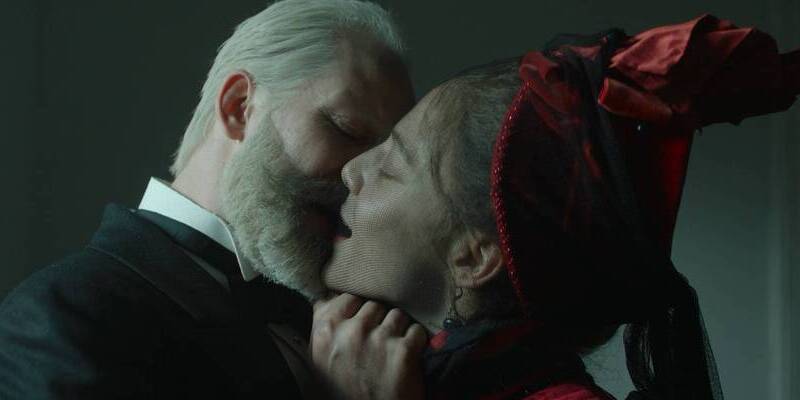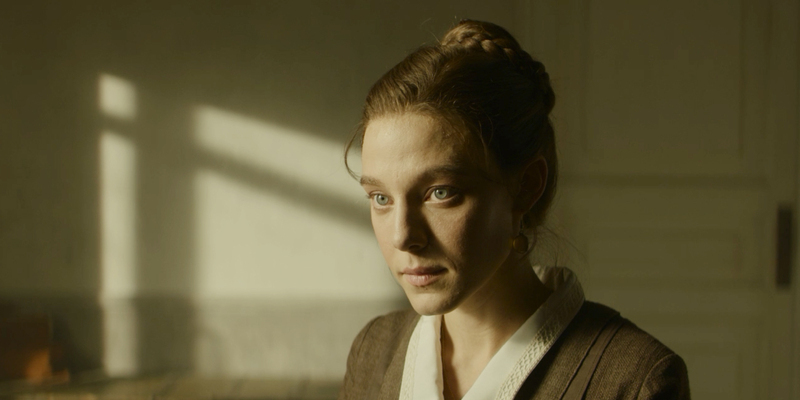
Review by
Benjamin Poole
Directed by: Kirill Serebrennikov
Starring: Odin Lund Biron, Alyina Mikhailova, Miron Fyodorov, Alexander Gorchilin

In a similar way to how untold millions have bloodily perished due to
improper applications of Christianity, the amount of misery engendered
by heterosexual orthodoxy must be of heart-breaking infinity. Take
Antonina Miliukova, in Kirill Serebrennikov's staid biopic
Tchaikovsky's Wife, the spouse of the titular composer in a marriage apparently so
unhappy that she ended up in an asylum. In the manner that many wives of
famous musicians are judged (viz, Yoko Ono, Courtney Love), Miliukova
was much maligned and considered an opportunistic gold digger who
knowingly exploited fully grown man and bona fide genius Tchaikovsky,
fatally contributing to his ruin. Serebrennikov's film is an attempt to
redress the mythology, and instead frames Miliukova as a romantic
innocent whose genuine and unrequited desires led to tragedy.

Notably, Serebrennikov's Nina (Alyona Mikhailova) is no shrinking
violet. Her love is real throughout the film, and so is Nina's agency.
In the film's opening flashback we see the composer (Odin Lund Biron) playing piano in a dinner party; dashing, well dressed (Dmitry Krupennikov's costume design is to die for) and at ease with the women around him
(as gay men tend to be as they're not scared of them), Nina is instantly
smitten with the guy and embarks on a sustained campaign to woo him,
with the composer eventually acquiescing after a particularly
overwrought love letter (preferred medium of the romantic idealist).
Well aware of his god given gayness, Tchaikovsky promises Nina, the
"gentle, calm love" of a brother, and she protests that any of his
"flaws are of no consequence" to her. We'll see! The engagement sequence
is blocked ingeniously, with a static camera framing the two as they
circle each other, the audience catching the look of self-reproach as
Tchaikovsky brokers a marriage of convenience while delighted Nina has
her dreams realised. To us, the space between them is palpable and
doomed.

Tchaikovsky was homosexual in a country which even now seems proud to
rampantly censor gay people (see the relatively recent legislation
regarding "gay propaganda" - 2013! And you thought this review's opening
line was hyperbole! One wonders how this explication of the composer's
sexuality will go down in his home country). While the film knows better
than to definitively expound upon the massively complicated reasons as
to why Tchaikovsky enters into a relationship with Nina (self-loathing,
appearances sake, expectation: all part of it) we are left in no doubt
that the compromise is a deeply unfortunate mistake. Furthermore, this
film isn't about him, it is Nina who is central to the frame throughout.
As the film glissandos through time, opening with Tchaikovsky's funeral,
which leads to the subsequent wranglings of his legacy, and then back to
different points of the deteriorating relationship, it is frustrated,
lovelorn Nina who is our point of identification.
Poignantly, this malaise is communicated via a leitmotif of
masturbation: Nina does it to herself in an attempt to rouse her
husband, Tchaikovsky in a vain effort to muster enthusiasm.
Serebrennikov imposes such discomfiting scenes in order to transfer the
spiritual distance between the two, a remoteness that is nonetheless
cruelly intimate.

Is there any era with a more sumptuous iconography than 19th Century
Russia? It's all here, beautifully recreated in thick linen costumes,
luxurious snow and ivory drawing rooms. A visual set which takes us
through idealised dream sequences and nightmare manifestations of
asylums and madness. The filmmaking overwhelms the senses but the
desperate compassion of the performances reminds us that, despite the
prodigious nature of Tchaikovsky and the specifics of his sexuality,
this is a tale of human desire and everyday misery given epic Soviet
sweep.

Tchaikovsky's Wife is in UK
cinemas from December 29th.

